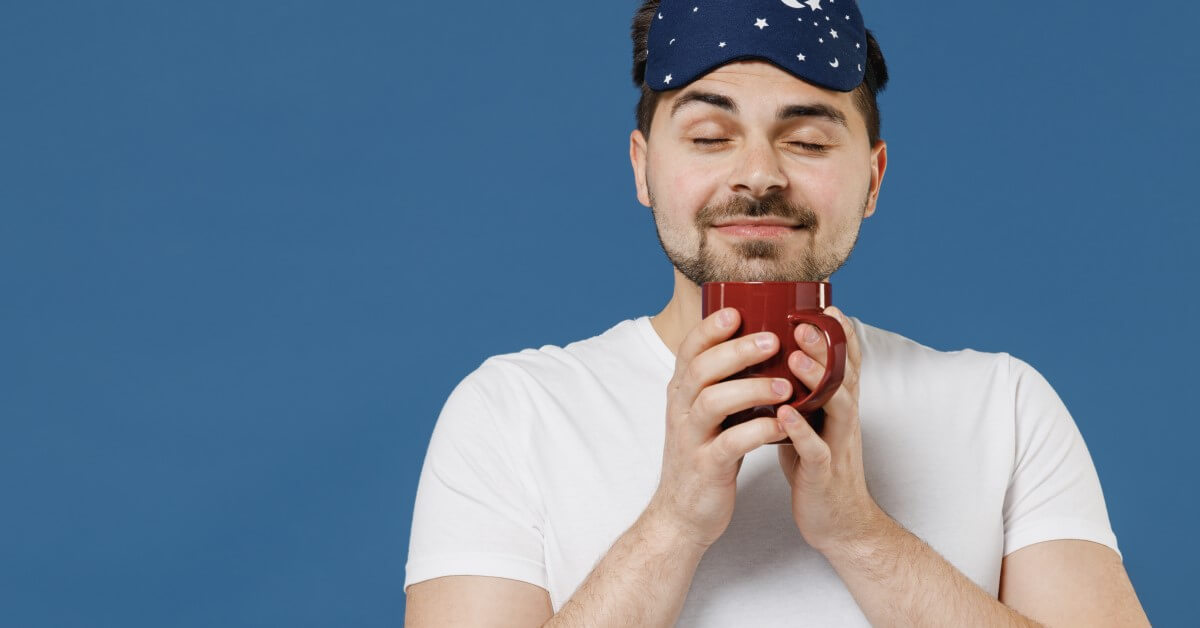Use the player to listen to the article and/or continue to read below.
Paradoxical Intention | Socks | Breathe to sleep | The Case for Dairy | The Peel is the Real Deal
Introduction
Many of us may remember being told that a glass of warm milk would help us fall asleep, and it seems that there may be something to this adage.
The milk trick isn’t the only sleep hack out there. Whether these sleep aids are placebos or authentic solutions for sleep issues may be up for debate in some cases, but if the result is better sleep – we won’t argue.
Let’s look at some interesting, unexpected, and often quirky ways to get a good night’s rest.
Paradoxical Intention
Paradoxical intention is part of a cognitive modality that persuades patients to participate in their feared activity.
As for insomnia, this approach is based on the idea that performance anxiety inhibits sleep onset.[1]
Paradoxically, if you stop trying to fall asleep and focus on staying awake, the performance anxiety should diminish, leading to more effortless sleep. Talk about reverse psychology!
Socks
Research has shown that wearing socks to bed can decrease the time it takes to fall asleep.[2]
Wearing warming footwear in bed seems to help with lowering the body’s core temperature, which is a natural way for the body to transition into sleep mode.
Warming the feet causes blood vessels to dilate, signaling to the brain that it is now time for sleep.
Breathe to sleep
Deep breathing or rhythmic breathing techniques can profoundly affect relaxation, so why not sleep?
And when it comes to breathing work for sleep, the “4-7-8” method seems to be the most popular.
Start by breathing in deeply for four seconds. Next, hold your breath for seven seconds, followed by a slow, eight-second exhale. Repeat this four times.
The method promotes relaxation by giving your body a large shot of oxygen.[3] The best part of this simple breathing exercise is that it can be done any time of the day or night to keep anxiety at bay.
The Case for Dairy
Ok, so mom may have been right after all. Glass of milk can help you sleep.
Research suggests that tryptophan – a type of protein found in dairy – helps to raise serotonin and melatonin levels in your body.[4] Those are two hormones your body naturally produces for initiating sleep, but this effect is heightened with dairy foods. Sip a glass of warm milk with some grated nutmeg, a natural sedative.
The Peel is the Real Deal
Have you ever heard of banana tea? It’s a thing, and it can help you fall asleep and stay asleep.
Bananas, and especially their skins, are loaded with magnesium[5] and potassium[6] (both help to relax muscles) and tryptophan. You may use the whole fruit (organic only, to avoid any pesticides), including the flesh.
To enjoy a cup of banana tea before bed, cut the ends off a banana, slice it up, and place the pieces into 2 cups of boiling water. Allow it to steep for about 20 minutes. Strain this mixture to get the liquid and add some honey or cinnamon to taste.
Conclusion
Getting good-quality sleep is becoming more challenging. In fact, up to a third of us may suffer from insomnia[7].
Although there are many treatment methods, including therapeutic and cognitive interventions for this issue, it’s always best to try natural, drug-free remedies first.
Weird sleep hacks exist because they undoubtedly work for some people, and even though they may not work for others, they are at least worth a try for a refreshing, good night’s sleep.
References:
- Paradoxical intention for insomnia: Society of Clinical Psychology. Society of Clinical Psychology | Division 12 of the American Psychological Association. (2018, March 8). Retrieved June 24, 2022, from https://div12.org/treatment/paradoxical-intention-for-insomnia/#:~:text=Paradoxical%20intention%20is%20a%20cognitive,performance%20anxiety%20inhibits%20sleep%20onset.
- Raymann RJ, Swaab DF, Van Someren EJ. Skin temperature and sleep-onset latency: changes with age and insomnia. Physiol Behav. 2007 Feb 28;90(2-3):257-66. doi: 10.1016/j.physbeh.2006.09.008. Epub 2006 Oct 27. PMID: 17070562.
- Jerath, R., Beveridge, C., & Barnes, V. A. (2019). Self-Regulation of Breathing as an Adjunctive Treatment of Insomnia. Frontiers in psychiatry, 9, 780. https://doi.org/10.3389/fpsyt.2018.00780
- Komada, Y., Okajima, I., & Kuwata, T. (2020). The Effects of Milk and Dairy Products on Sleep: A Systematic Review. International journal of environmental research and public health, 17(24), 9440. https://doi.org/10.3390/ijerph17249440
- Cao Y, Zhen S, Taylor AW, Appleton S, Atlantis E, Shi Z. Magnesium Intake and Sleep Disorder Symptoms: Findings from the Jiangsu Nutrition Study of Chinese Adults at Five-Year Follow-Up. Nutrients. 2018 Sep 21;10(10):1354. doi: 10.3390/nu10101354. PMID: 30248967; PMCID: PMC6212970.
- Heizhati M, Zhang Y, Shao L, Wang Y, Yao X, Abulikemu S, Zhang D, Chang G, Zhou L, Li N. Decreased serum potassium may disturb sleep homeostasis in essential hypertensives. Hypertens Res. 2019 Feb;42(2):174-181. doi: 10.1038/s41440-018-0131-4. Epub 2018 Nov 16. PMID: 30446708; PMCID: PMC8075976.
- Bhaskar, S., Hemavathy, D., & Prasad, S. (2016). Prevalence of chronic insomnia in adult patients and its correlation with medical comorbidities. Journal of family medicine and primary care, 5(4), 780–784. https://doi.org/10.4103/2249-4863.201153







